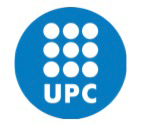
Universitat Politècnica de Catalunya- BarcelonaTech (UPC)
Department of Construction Engineering
Calle Jordi Girona 31, Barcelona, 08034,
Spain
UPC is specialised in architecture, science and engineering. It has 33400 students, 23 schools, 69 graduate/undergraduate programs, and 62 masters (22 taught entirely in English). UPC continues its commitment to economic development and strengthening its continuing education programs through the UPC Foundation. UPC‘s Technology Transfer Center (TTC) is a substantial R&D contributor to Catalonia’s industrial sector.
UPC is currently working in over 250 research areas, and we have a growing number of specific research centers and regional technology centers focusing on current research needs. Since 2007 the TTC from UPC is currently managing about 136 projects of the 7th Framework Program, 23 of which are Marie Curie Actions. UPC has officially endorsed the Charter and Code. Civil Engineering is ranked 36th in the 2014 QS World University Rankings.
The European Projects Office of the Center for Technology Transfer, the Human Resources Department and the International Relations Service of UPC provide support to the researchers at the incoming phase to UPC as in the case of researchers who benefit from Marie Curie Actions. Once the project has been awarded the three services coordinate its work in order to provide the best possible assistance to the incoming fellow.
Professor Casas has been involved in COST345 (safety & serviceability assessment of highway structures), COST601 (Robustness of Structures), FP5 SAMARIS (Sustainable & Advanced Materials for Road InfraStructures), FP6 SUSTAINABLE BRIDGES and ARCHES (Assessment & Rehabilitation of Central European Highway Structures) where he lead WP2 on the development of bridge assessment.
- Villalba, S. and Casas, J.R. (2013), ‘Application of optical fiber distributed sensing to health monitoring of concrete structures’, Mechanical Systems and Signal Processing, 39: 441-451. [DOI]
- Rodrigues, F., Casas, J.R. and Almeida, P. (2013), ‘Fatigue-Safety assessment of RC bridges. Application to the Brazilian highway network’, Structure and Infrastructure Engineering, 9(6):601-616. [DOI]
- Casas, J.R. and Wisniewski, D. (2013), ‘Safety requirements and probabilistic models of resistance in the assessment of existing railway bridges’, Structure and Infrastructure Engineering, 9(6): 529-545. [DOI]
- Ismail, M. and Casas, J.R. (2014), ‘A novel isolation device for protection of cable-stayed bridges against near-fault earthquakes’, Journal of Bridge Engineering (ASCE), 19(8). [DOI]
- Casas, J.R. (2011), ‘Reliability-based assessment of masonry arch bridges’, Construction and Building Materials, 25(4):1621-1631. [DOI]



